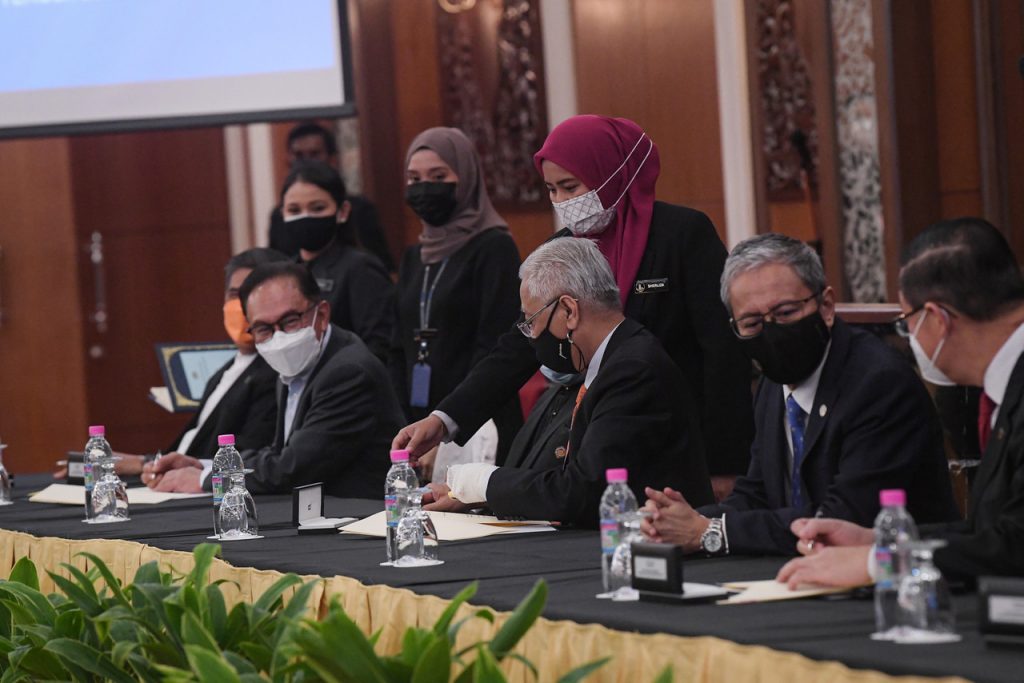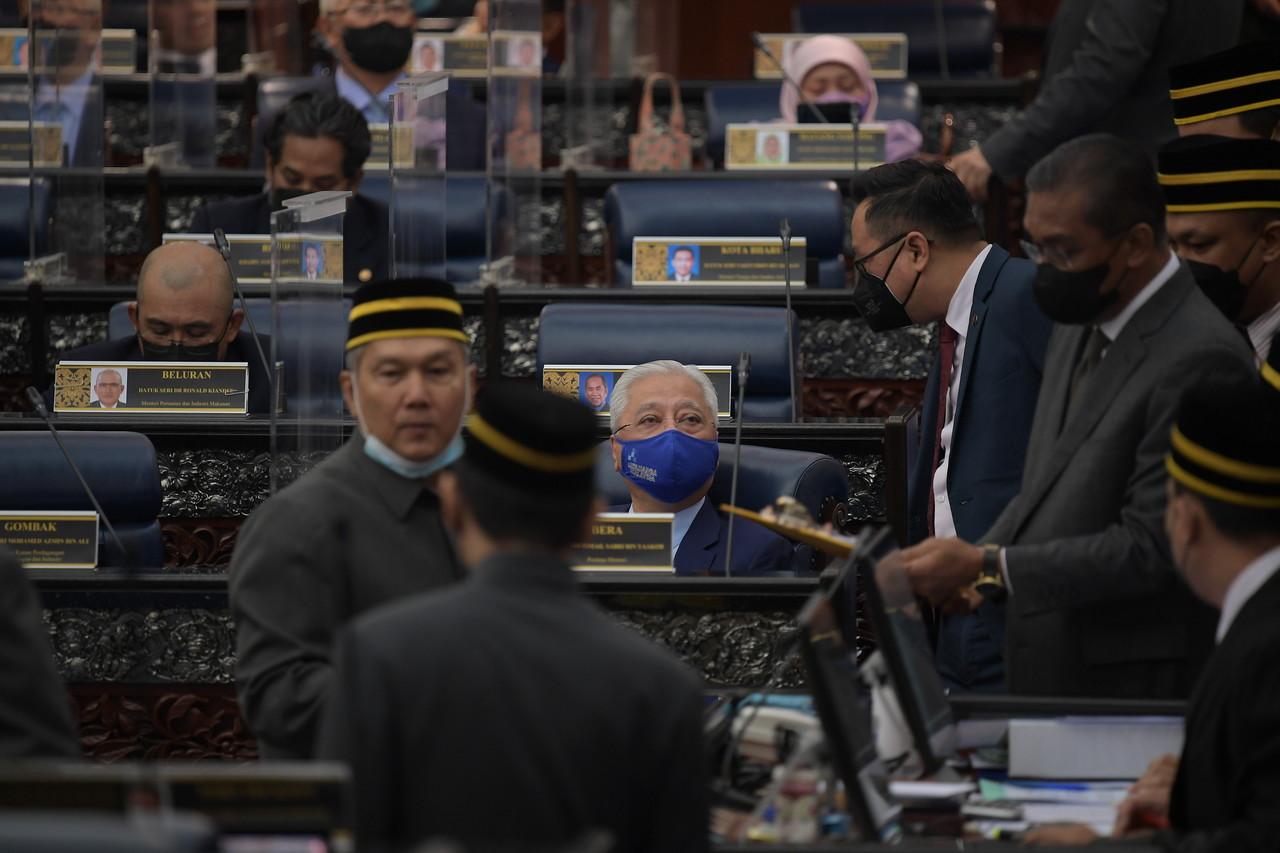Parliamentary bungle turns into political drama
The spotlight is on PM Ismail Sabri Yaakob's agreements with the opposition coalitions as the 'court cluster' ramps up the pressure for polls.
Just In
A parliamentary bungle that saw government MPs including Cabinet members being absent for a vote on a crucial bill tabled by the home minister is rapidly turning into a political drama, against a backdrop of two agreements signed by Prime Minister Ismail Sabri Yaakob involving two opposing camps.
Yesterday, a government bill on the Security Offences (Special Measures) Act 2012 was shot down after MPs from Pakatan Harapan (PH) voted against it.
The vote was called at a time when almost all of the bigwigs from the ruling blocs including Barisan Nasional, Perikatan Nasional (PN) and GPS were absent from the Dewan Rakyat, giving opposition MPs the numbers needed to defeat the bill.
Sources close to several government backbenchers questioned what they said was a communication breakdown which led to many MPs not being informed, with at least two of them saying they were not made aware that they needed to be present in the Dewan Rakyat for a pending vote.
“Normally we would be briefed, but this time, there appeared to be some miscommunication.”
A DAP source told MalaysiaNow that the opposition had not expected the bill to be defeated, a rare occurence in the Malaysian parliament.
“The largely absent bloc on the government’s side allowed this victory for us.”
The aftermath of the bill’s rejection, however, was more focused on the memorandum of understanding (MoU) signed between PH and Ismail in September last year, where the opposition MPs had pledged to either support or abstain from voting on government bills in return for a list of “transformations” to be implemented.
The move to vote against the bill yesterday has been described by some quarters as a breach of the MoU, which could leave Ismail with no choice but to succumb to pressure from the so-called “court cluster” leaders in Umno to dissolve Parliament and call for an early general election.
The court cluster is led by former prime minister Najib Razak and Umno president Ahmad Zahid Hamidi, both of whom are facing scores of corruption charges that could see them doing time in jail as well as being banned from politics.
Last year, about a dozen Umno MPs aligned with the duo retracted their support for then prime minister Muhyiddin Yassin, in what was thought to be a response to the Bersatu leader’s refusal to help court cluster leaders in their criminal trials.
This resulted in the collapse of the PN government, amid warnings by some in PH that it would resurrect an Umno-led government answerable to the court cluster.
Eager to avoid the same fate, Ismail, the Umno vice-president who became prime minister after Muhyiddin committed the support of about 50 PN MPs, has been walking a thin line.

It is understood that Muhyiddin’s support is contingent on several matters, one of which is the date of the 15th general election, which Ismail must decide after consultation with PN.
Since coming to power, he has sought to consolidate his position by offering to fulfil some demands by PH, in exchange for the opposition coalition’s assurance that it will not attempt to disrupt major government bills such as the budget.
But yesterday’s move to shoot down the government bill has threatened Ismail’s position since some view it as a PH breach of the MoU.
Following the vote, even Annuar Musa, seen as one of the Umno leaders opposed to the court cluster’s call for early polls, urged Ismail to dissolve Parliament to pave the way for the general election, saying PH had violated the spirit of its MoU with the prime minister by opposing the bill on Sosma.
PH leaders including its chairman Anwar Ibrahim insist that there was no such breach.
DAP said PH MPs were only expected to support or abstain from government bills related to the budget and insofar as they had an impact on Ismail’s position as prime minister.
Still, a source from PKR told MalaysiaNow that there had been discussions on whether the move to reject the bill on Sosma yesterday would backfire.
“If this is seen as breaching the MoU and giving a reason for Ismail to dissolve Parliament, then the worry is the big election defeat staring at PH at a time when voter turnout and sentiments do not appear to be on our side,” said the source who had been among those tasked with organising the inking of the MoU between PH and Ismail last year.
The MoU signed with PH stated among others that Ismail would not call for a general election before July 31 this year.
A delay in polls would be seen as a breather for PH amid widespread expectations of electoral losses for the coalition if a general election is held long before the current mandate expires in May 2023.
Another source familiar with the drafting of the MoU told MalaysiaNow that the move by PH leaders to pile pressure on Ismail over issues such as an anti-hopping law, that would effectively ban MPs from crossing over, could work against the coalition.
“The biggest threat to PH now is a general election and voter apathy. The dismal performance in Melaka and Johor, especially for PKR, not to mention in the Sarawak election, has only confirmed such worries,” the PKR source added.
Last week, Ismail diplomatically fought off calls in the Umno general assembly for the dissolution of Parliament.
Confident of BN making a recovery on the back of voter apathy, Najib and Zahid have been ramping up pressure for a general election, hoping to improve their chances of escaping their legal predicaments under a government they control.
Najib faces 12 years in jail after being convicted of the misappropriation of RM42 million linked to SRC International. This would cause him to lose his eligibility to contest coming elections.
Meanwhile, Zahid’s corruption trial is set to play out this year.
Both Muhyiddin and former leader Dr Mahathir Mohamad have said that Zahid approached them when they were prime ministers in the hope of getting their help to drop the charges against him.
Subscribe to our newsletter
To be updated with all the latest news and analyses daily.
Most Read
No articles found.
